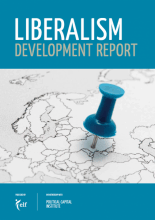Is liberalism is really on the decline? In the current wave of populist players in Western Europe and the United States, and “illiberal” tendencies on the rise, there is a general assumption that liberalism is on the collapse.
The demise of liberalism has practically become a commonplace in contemporary political discourses. But this study of the European Liberal Forum, in partnership with the Political Capital Institute, paints a different picture – at least on the European scene. It is not only that liberal parties are performing relatively well on elections in several countries and the ALDE Group has more seats in the European parliament than in the previous cycle, but liberal attitudes seem to be widespread in Europe.
The goal of this study is to measure the attitudinal demand for liberal policies in European countries. The results can be rather encouraging for some liberal players in the sense that the group of voters who share liberal attitudes is, in several countries, bigger, than the current electorate of liberal parties. Targeting these voters is a challenge of course, and in the current wave of negative sentiment, it might become even more challenging. Furthermore, there is an attempt by the rising populist right forces in Europe to distort and appropriate the notion of Freedom and Liberty, and use these notions to spread xenophobic and law and order responses – “in defence of freedom”. But we can see that even in countries where liberalism can have negative connotations and where the demand is low (e.g. in Central Eastern Europe), some players can be pretty successful in overcoming the barriers.
This study, giving a better understanding of the voters’ liberal attitudes in Europe, might help in the challenging work of keeping the existing liberal voters and reach out to new ones. This study is mainly written for politicians, journalists, and experts who are interested in spreading to liberal values and policies.
